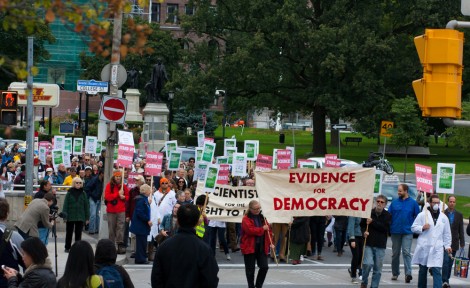“From small labs come big discoveries,” read a banner at the Stand Up For Science! protest on September 16. Around 250 people gathered in Queen’s Park to rally against the cuts made to scientific research across Canada. In Ottawa, Vancouver, Halifax, Montreal and Queen’s Park, protestors simultaneously urged the federal government to make a greater commitment to science in the public interest by restoring science funding and supporting open communication of publicly-funded research.
Many picket signs handed out at the event condemned the fact that 100 per cent of all new funding for Canada’s three granting councils in the 2013 federal budget is dedicated to research partnerships with industry.

AARON TAN/THE VARSITY
Chris Austin, a master’s student studying biology at the University of Western Ontario, was one of 1,000 attendees at the Death of Evidence protest last year in Ottawa, which highlighted similar concerns. He was also at Queen’s Park on Monday: “These cuts are unacceptable. Canada used to be a leader in world research, and now it’s a joke,” he said. Canada is currently ranked seventh among the G8 countries in the percentage of its GDP spent on advanced research computing, and Austin is worried about the closure of field stations and research centres, such as the Experimental Lakes Area, a facility for ecosystem-scale experimental investigations and monitoring in northwestern Ontario.
Evelyn Boychuk is also doing a master’s in biology at Western. “I’ve always been super-passionate about this,” the aspiring bio-journalist said. Boychuk highlighted the role of chance in scientific progress, noting that some of the world’s greatest scientific discoveries came about entirely by chance. She fears that the cuts are “taking away that chance” and believes that “science isn’t a priority for the
Conservative government.”
Eva Everything, an environmental scientist, is especially concerned about the impact on availability of information about the effect of human behaviour on the environment. Everything pointed to a study by Fisheries and Oceans Canada research scientist Dr. Peter Ross as an example of the kind of information that would not be known without sufficient funding. The study found that killer whales had five times the toxicity level of beluga whales. Everything said she participated in the rally to encourage the government to “restore our science programs and fund research to pure science.”

AARON TAN/THE VARSITY
Speaking at the protest were Dr. Margrit Eichler, professor emerita and president of Scientists for the Right to Know, and Brad Evoy, internal commissioner of the University of Toronto Graduate Students’ Union. Dr. Eichler hopes to see scientific funding become an election issue, calling science “the lifeblood of our future.” Evoy emphasized that “we’re not talking about a bad party; we’re talking about a policy.” The crowd also heard a statement from John Polanyi, the only living Canadian winner of the Nobel Prize. “[The benefits of science] will flow to your city, your country and the world. All three will thank you for ‘Standing Up For Science.’”
After hearing the speakers, Evoy led the march down to Elm Street, before returning to Queen’s Park. Eichler’s closing speech thanked the protesters for “taking a stand,” and promised more rallies in the coming months.


